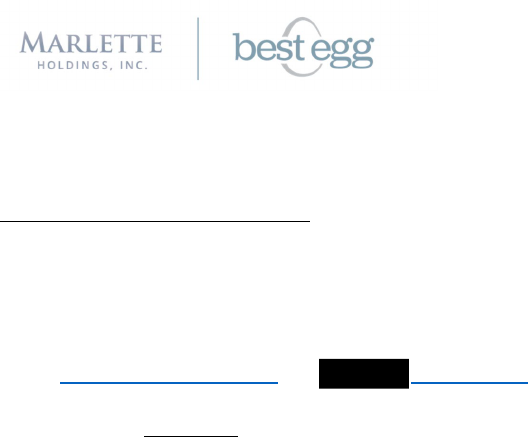
-1-
July 1, 2022
By Postal Mail and Electronic Mail
Department of Financial Protection and Innovation
Attn: Sandra Navarro
300 S. Spring Street, Suite 15513
Los Angeles, California 90013
Re: PRO 03-21
Dear Ms. Navarro and Mr. Bae:
We appreciate the opportunity to comment on PRO 03-21, the Notice of Proposed Rulemaking Under
the California Consumer Financial Protection Law: Consumer Complaints and Inquiries (the “Proposal”),
issued by the Department of Financial Protection and Innovation (the “Department”) and proposing to
add Article 5 (Sections 1070-1075) to Chapter 3, Subchapter 4 of the California Code of Regulations (the
“Proposed Regulations”). Marlette Holdings, Inc. (“Marlette”) is committed to consumer protection and
considers the consumer experience as a core part of its business. We welcome the opportunity to help
the Department in its missions of consumer protection and innovation.
Marlette is the operator of the Best Egg consumer-lending platform, and a financial technology provider
seeking better ways to assist banks in making money accessible to consumers. Marlette’s team mixes
decades of banking experience with deep customer knowledge and smart technology to deliver lending-
related digital products, services, and experiences to consumers on behalf of banks in a more relevant
way. Marlette works with banks, facilitating the banks’ origination of consumer loans and consumer
credit cards through the Best Egg platform. The Best Egg platform provides a frictionless online personal
lending experience where qualified applicants can instantly view loan offers with no impact to their
credit scores and receive a loan from a bank in as little as one business day. Since March 2014, Marlette
has helped banks deliver over $18 billion of prime loans, including particularly to underserved
consumers, with strong credit performance. Marlette’s subsidiary, Marlette Servicing, LLC, has
submitted an application for a California Debt Collection License and is currently awaiting the
Department’s response.
Marlette is a member of the American Fintech Council, a group of innovative, responsible companies
that have brought new and beneficial consumer lending products to consumers across the country.
Marlette joins and fully supports the comments that are being submitted separately by the American
Fintech Council.

-2-
We respectfully submit the following comments to assist the Department in achieving its, and
Marlette’s, goals of both protecting consumers and supporting innovation that benefits customers’
financial health.
Narrow the Focus of the Proposal. After studying the Proposed Regulations, requirements of other
agencies such as the Consumer Financial Protection Bureau (the “CFPB”) and the Federal Deposit
Insurance Corporation (the “FDIC”), and our own operational processes for learning and engaging with
our customers, we believe that the Proposed Regulations as drafted are overbroad and unnecessary
with respect to Marlette and other established, sophisticated companies with effective complaint
management processes already in place. We, like other responsible companies, have robust,
established policies and procedures in place, as well as a lengthy track record to ensure that we
investigate, address and respond to consumer complaints in a timely and satisfactory manner. The
consumer experience is vital to our business and success, and thus we believe that learning from and
responding to complaints is an opportunity to enhance the products, services and experience we can
offer to our customers.
For example, Marlette’s existing processes include:
- Numerous channels in which to submit a complaint, including telephone, mail, chat, email, and
social media. Consumers can also submit complaints to the CFPB, the FDIC, and the Better
Business Bureau. We also monitor multiple review websites for complaints and routinely send
surveys to our customers requesting feedback on their experience with Best Egg. These easy-
to-use complaint channels are available to everyone and provide ample opportunity for
consumers to express any concerns or dissatisfaction.
- Customer representatives who are trained to listen, learn and respond to complaints in real
time whenever possible. Each representative has authority to resolve complaints in most cases,
and to escalate more difficult or complicated complaints to customer service managers. All
complaints are recorded and tracked in Marlette’s system of record, and we analyze complaints
for trends and indications of areas in which we, as a company, could improve. Although we
track and learn from even frivolous complaints, an unduly bureaucratic, burdensome response
regime benefits neither the customer nor the company.
- Classification of complaints into categories that correspond to our business and enable us to
most effectively track, learn and respond. It would be expensive, disruptive and unhelpful to
adopt a different set of 17 categories that neither align with the categories that federal
regulators require of us, nor provide additional benefit in the goal of protecting customers
against unfair, deceptive or abusive acts or practices.
We note that we have not received any feedback – either from consumers or other regulators – that
Marlette’s current complaint response process is deficient.
Burden on Marlette will far exceed the Department’s estimate. We believe that the Proposed
Regulations would impose a significant burden on Marlette and similarly situated companies by
requiring compliance with the specific processes and obligations in the Proposed Regulations, without
providing any meaningful benefit to either consumers or the Department. In that regard, the
Department’s estimate of the burden on companies is much too low. The Department provided an
estimate of $2,500 in implementation costs and $4,000 in ongoing costs after implementation. We

-3-
estimate, very conservatively, that initial costs would run at least $50,000 and up to $100,000 for the
implementation of new systems, the change management required across each communication channel
and the development of redundant paperwork that provides no additional benefit to our customers. We
further expect ongoing costs to be substantial. For example, the proposed regulation would require:
- Significant operational changes associated with building and maintaining an after-hours
voicemail function when multiple other channels exist to serve the customer’s individual
communication preferences.
Entirely revamping and maintaining complaint handling timelines, procedures, and reporting to
meet the Proposal’s requirements, which do not align with the business needs for the same
processes.
- Tracking and responding to an expected increase in duplicative complaints, requiring
individualized (and duplicative) responses to each.
Further, the overly prescriptive requirements in the Proposal will permit abuse of the complaint system
by consumers with frivolous complaints. Dealing with those complaints can consume an inordinate
amount of resources. The goal of the complaint process should be to address actual errors experienced
by a customer rather than attacking legitimate company policies or processes that simply do not result
in the customer’s desired outcome.
Regulations should focus on areas with identified problems. We encourage the Department to focus
any final regulation on entities that have not demonstrated an ability to respond effectively to customer
complaints. Through its supervision and examination authority, the Department has broad access to the
complaint management processes at individual companies, including complaints about the complaint
process itself; any numerous and frequent escalation by customers to the Department; or repeated
violations of UDAAP and other consumer protections. Accordingly, we respectfully suggest and urge the
Department to focus its worthwhile goal of enhancing consumer protection on companies that have
historically targeted vulnerable populations, a history of predatory lending, or abusive practices -- and
correspondingly higher volumes of consumer complaints. By casting a net as wide as the Proposal, we
believe the Department would create an overbroad and unduly burdensome regime that would sap the
agility of responsible companies, drain valuable resources and fail to achieve any meaningful change in
the critical goal of preventing unfair, deceptive, and abusive acts and practices.
Requirements regarding inquiries are unnecessary. We also request that the Department withdraw the
sections of the Proposed Regulations addressing inquiries. An inquiry is, by definition, not a complaint;
the customer is not dissatisfied, but merely asking for additional information or assistance. Marlette
and other covered persons already have sufficient business reasons to respond to inquiries in a timely
manner; inquiries frequently resolve questions that allow consumers to use the products and services
that we offer. Extending a formal tracking system to inquiries will only impose additional costs.
Increased burdens will harm competition. An overly burdensome complaint process will also harm
consumers by imposing undue costs on entities that are subject to the California Consumer Financial
Protection Law. Under Financial Code Section 90002, many entities are exempt, including banks, bank
holding companies, credit unions, finance lenders, residential mortgage lenders, broker-dealers, and
more. These entities are already subject to regulatory expectations regarding complaint responses – or

-4-
no requirements at all. There is no reason to impose a greater burden on covered persons by hindering
their ability to effectively compete with entities that are not subject to these requirements.
Exceptions for certain complaint processes subject to federal regulation. Certain types of
communications that could be considered “complaints” or “inquiries” under the Department’s Proposed
Regulation are already subject to existing regulatory frameworks. These include billing error disputes,
claims of unauthorized use, and payment defenses that are regulated by the federal Fair Credit Billing
Act and the CFPB’s Regulation Z (see 12 C.F.R. §§ 1026.12(b) & (c) and 1026.13), and disputes about
information in consumers’ credit reports that are regulated by the federal Fair Credit Reporting Act and
the CFPB’s Regulation V (see 15 U.S.C. § 1681i, 12 C.F.R. § 1022.43). The Proposed Regulations should
exempt these complaints, in order to avoid inconsistent or duplicative obligations on covered persons.
Complaints received through other government channels – such as the CFPB or the FDIC – should also
be exempt in the interest of reducing duplication and the ministerial burden.
Permit flexibility as long as companies responsibly handle complaints and make data available to the
Department. Overall, we believe that the Department would best serve consumers and the goal of
innovation by permitting flexibility, establishing basic requirements for complaint handling, and allowing
companies to develop their own processes to meet those requirements. Allowing companies to exercise
flexibility will serve the Department’s goals of protecting consumers, with the authority to enforce
against those who fail to establish reasonable processes but without requiring the upheaval of
reinventing complaint channels, timelines, tracking, and information gathering by companies with
sustainable, reasonable processes already in place.
In addition, we urge the Department to consider that, for most covered persons, much information
about consumer complaints is already available from the CFPB. Creating a duplicative public reporting
requirement is unnecessary and provides no meaningful benefit.
Marlette appreciates the Department’s effort to implement the California Consumer Financial
Protection Law, and the opportunity to provide these comments. We thank you for taking the time to
consider these comments as you review the proposed regulation. We welcome you to contact me, Jean
Traub, General Counsel or or Lauren Abbott, Associate
General Counsel or ) if you would like to discuss these
comments further.
Very truly yours,
_________________________
Jean K. Traub
General Counsel, Marlette Holdings, Inc.
